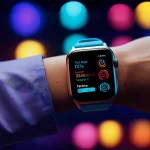In 1906, Dr. Alois Alzheimer peered through a microscope and spotted something unusual: clumps and tangles in a patient’s brain tissue. This groundbreaking observation marked the first identification of what we now know as Alzheimer’s disease. Fast forward to today, and we’re not just looking through microscopes anymore. We’re using artificial intelligence to peer into the future of our minds.
Sounds like science fiction, doesn’t it? But it’s happening right now in labs and hospitals worldwide. AI algorithms are crunching vast amounts of data – brain scans, genetic information, even the way we walk and talk – to predict cognitive decline years before symptoms appear.
For those of us in our 50s, 60s, and beyond, this isn’t just another tech breakthrough. It’s deeply personal. We’ve watched loved ones struggle with memory loss. We’ve wondered if that moment of forgetfulness is just a “senior moment” or something more serious.
But here’s where it gets interesting – and a bit unsettling. These AI systems aren’t just passive observers. They’re active predictors, potentially spotting the first whispers of cognitive decline long before we notice anything amiss.
Think about that for a moment. What if a machine could tell you, with a high degree of accuracy, that you’re likely to experience significant memory problems in five or ten years? Would you want to know? And if you knew, what would you do differently?
As we stand on the brink of this cognitive crystal ball, we face profound questions about privacy, ethics, and the very nature of aging. Are we ready for machines to predict our mental future? Can we trust their predictions? And perhaps most importantly, how will this knowledge change the way we live, plan, and care for our aging minds?
Let’s dive into the world of AI and cognitive health, exploring these questions and more. The answers may reshape our understanding of aging, memory, and what it means to grow old in the age of artificial intelligence.
Overview
- AI is revolutionizing cognitive health prediction and monitoring.
- Machine learning algorithms analyze diverse data types to detect early signs of decline.
- Novel AI assessments include analysis of daily activities, handwriting, and speech patterns.
- AI is uncovering new insights in genomics and microbiome research related to cognitive health.
- Challenges include data quality, ethics, and integration with current medical practices.
- Future directions focus on improved datasets, transparency, and clinical implementation.















